
Vox is a British musical equipment manufacturer founded in 1957 by Thomas Walter Jennings in Dartford, Kent, England. The company is most famous for making the Vox AC30 guitar amplifier, used by The Beatles, The Rolling Stones, The Kinks, The Yardbirds, Queen, Dire Straits, U2, and Radiohead; the Vox Continental electric organ, the Vox wah-wah pedal used by Jimi Hendrix, and a series of innovative electric guitars and bass guitars. Since 1992, Vox has been owned by the Japanese electronics firm Korg.

An instrument amplifier is an electronic amplifier that converts the often barely audible or purely electronic signal of a musical instrument into a larger electronic signal to feed to a loudspeaker. An instrument amplifier is used with musical instruments such as an electric guitar, an electric bass, electric organ, electric piano, synthesizers and drum machine to convert the signal from the pickup or other sound source into an electronic signal that has enough power, produced by a power amplifier, to drive one or more loudspeaker that can be heard by the performers and audience.

A guitar amplifier is an electronic device or system that strengthens the electrical signal from a pickup on an electric guitar, bass guitar, or acoustic guitar so that it can produce sound through one or more loudspeakers, which are typically housed in a wooden cabinet. A guitar amplifier may be a standalone wood or metal cabinet that contains only the power amplifier circuits, requiring the use of a separate speaker cabinet–or it may be a combo amplifier, which contains both the amplifier and one or more speakers in a wooden cabinet. There is a wide range of sizes and power ratings for guitar amplifiers, from small, lightweight practice amplifiers with a single 6-inch speaker and a 10-watt amp to heavy combo amps with four 10-inch or four 12-inch speakers and a 100-watt amplifier, which are loud enough to use in a nightclub or bar performance.

Boss is a manufacturer of effects pedals for electric guitar and bass guitar. It is a division of the Roland Corporation, a Japanese manufacturer that specializes in musical equipment and accessories. For many years Boss has manufactured a wide range of products related to effects processing for guitars, including "compact" and "twin" effects pedals, multi-effect pedals, electronic tuners and pedal boards. In more recent times, Boss expanded their product range by including digital studios, rhythm machines, samplers and other electronic music equipment. They also are now manufacturing solid-state amplifiers and speaker heads such as the Waza and the Katana. Both feature multi-effects units meant to emulate Boss' classic effects pedals.

Peavey Electronics Corporation is a privately-owned American company which designs, develops, manufactures, and markets professional audio equipment. Headquartered in Meridian, Mississippi, Peavey is one of the largest audio equipment manufacturers in the world.

Marshall Amplification is a British company that designs and manufactures music amplifiers and speaker cabinets. Founded in London by shop owner and drummer Jim Marshall, the company is based in Bletchley, Milton Keynes, England. Since March 2023, Marshall Amplification has been one of several divisions of the Swedish conglomerate, the Marshall Group.
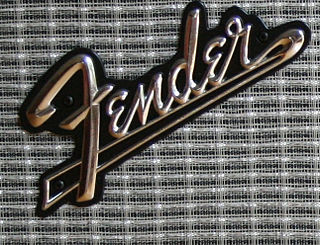
Fender amplifiers are electric instrument amplifiers produced by the Fender Musical Instruments Corporation. The first guitar amplifiers attributed to Leo Fender were manufactured by the K&F Manufacturing Corporation (K&F) between 1945 and 1946. Later, Fender began building its own line of electric guitars. Fender amplifiers would become favorites of guitarists like Jimi Hendrix, Eric Clapton, and Stevie Ray Vaughan, also known in these cases for playing Fender guitars.
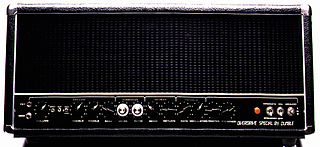
Dumble was a guitar amplifier manufacturer in Los Angeles, California.

The Ibanez Tube Screamer is a guitar overdrive pedal, made by Ibanez. The pedal has a characteristic mid-boosted tone popular with blues, rock and metal players. The Tube Screamer has been used by many guitarists to create their signature sound, and is one of the most successful, widely copied, and custom-modified ("modded") overdrive pedals in the history of the electric guitar.
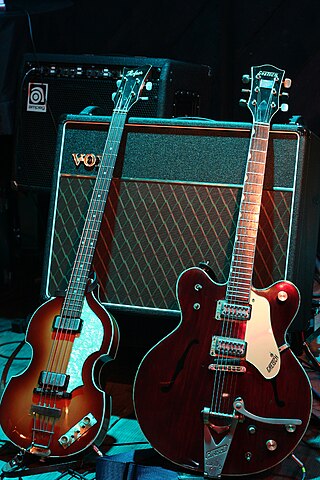
The Vox AC30 is a guitar amplifier manufactured by Vox. It was introduced in 1958 to meet the growing demand for louder amplifiers. Characterised by its "jangly" high-end sound it has become widely recognized by British musicians and others, such as George Harrison and John Lennon of the Beatles, Bill Wyman of the Rolling Stones, Brian May of Queen, Dave Davies of the Kinks and Hank Marvin.

A bass amplifier is a musical instrument electronic device that uses electrical power to make lower-pitched instruments such as the bass guitar or double bass loud enough to be heard by the performers and audience. Bass amps typically consist of a preamplifier, tone controls, a power amplifier and one or more loudspeakers ("drivers") in a cabinet.

Distortion and overdrive are forms of audio signal processing used to alter the sound of amplified electric musical instruments, usually by increasing their gain, producing a "fuzzy", "growling", or "gritty" tone. Distortion is most commonly used with the electric guitar, but may also be used with other electric instruments such as electric bass, electric piano, synthesizer and Hammond organ. Guitarists playing electric blues originally obtained an overdriven sound by turning up their vacuum tube-powered guitar amplifiers to high volumes, which caused the signal to distort. While overdriven tube amps are still used to obtain overdrive, especially in genres like blues and rockabilly, a number of other ways to produce distortion have been developed since the 1960s, such as distortion effect pedals. The growling tone of a distorted electric guitar is a key part of many genres, including blues and many rock music genres, notably hard rock, punk rock, hardcore punk, acid rock, grunge and heavy metal music, while the use of distorted bass has been essential in a genre of hip hop music and alternative hip hop known as "SoundCloud rap".

The Fender Twin and Twin Reverb are guitar amplifiers made by Fender Musical Instruments Corporation. The Twin was introduced in 1952, two years before Fender began selling Stratocaster electric guitars. The amps are known for their characteristically clean tone.
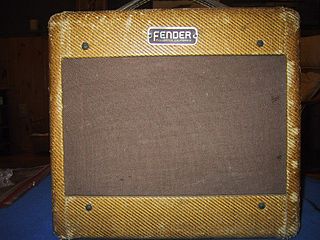
The Fender Champ was a guitar amplifier made by Fender. It was introduced in 1948 and discontinued in 1982. An updated version was introduced in 2006 as part of the "Vintage Modified" line.
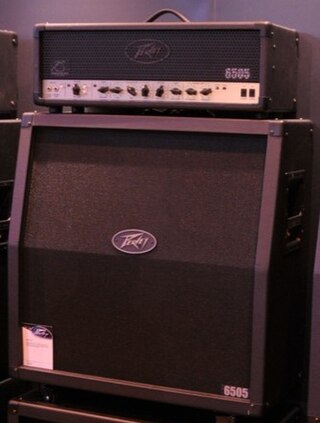
The Peavey 5150 is a vacuum tube based guitar amplifier made by Peavey Electronics from 1992 on. The amplifier was initially created as a signature model for Eddie Van Halen. After Van Halen and Peavey parted ways in 2004, the name was changed to Peavey 6505 in celebration of Peavey's 40th anniversary (1965–2005). The 5150 name was used again by Van Halen in partnership with Fender under the EVH brand in 2007 and 2011.

The Mesa/Boogie Mark Series is a series of guitar amplifier made by Mesa Engineering. Originally just referred to as "Boogies", the product line took on the moniker "Mark Series" as newer revisions were put into production. The Mark Series amplifier was Mesa's flagship product until the introduction of the Rectifier series, and the amplifiers are collectable.
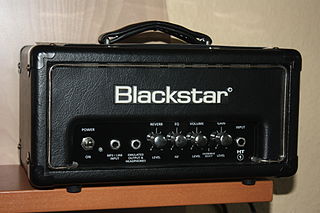
Blackstar Amplification is a British company that produces and manufacturers guitar amplifiers and effects units. The company was founded by a group of ex-Marshall employees, most notably Bruce Keir, who became technical Director at Blackstar, and former Chief Design Engineer at Marshall, Ian Robinson. In 2009 the company began operations in the United States. The majority of the research and development for Blackstar is carried out in the UK. Blackstar is endorsed by major artists like Ozzy Osbourne, Neal Schon, Opeth, and Richie Sambora of Bon Jovi. Blackstar has been consistently ranked amongst the best amplification brands by leading guitarists. Bruce Keir died in September 2021 at the age of 60.
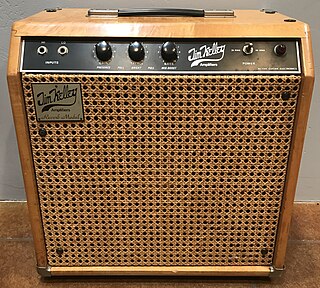
Jim Kelley Amplifiers is the trademark for the vacuum tube guitar amplifiers designed by Jim Kelley and manufactured by his company Active Guitar Electronics of Tustin, California between the years of 1978 and 1985. Approximately 600 of these amps were built during that time. The single-channel version of the amplifier employed modest gain in the preamp stages, Baxandall type bass and treble controls, a split load phase inverter, and four 6V6GT output tubes. The amplifiers produce 60 watts RMS at full power, and include a half power (30/60) switch.
Amplifier modeling is the process of emulating a physical amplifier such as a guitar amplifier. Amplifier modeling often seeks to recreate the sound of one or more specific models of vacuum tube amplifiers and sometimes also solid state amplifiers.
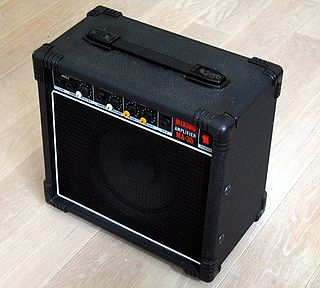
A keyboard amplifier is a powered electronic amplifier and loudspeaker in a speaker cabinet used for the amplification of electronic keyboard instruments. Keyboard amplifiers are distinct from other types of amplification systems such as guitar amplifiers due to the particular challenges associated with making keyboards sound louder on stage; namely, to provide solid low-frequency sound reproduction for the deep basslines that keyboards can play and crisp high-frequency sound for the high-register notes. Another difference between keyboard amplifiers and guitar/bass amplifiers is that keyboard amps are usually designed with a relatively flat frequency response and low distortion. In contrast, many guitar and bass amp designers purposely make their amplifiers modify the frequency response, typically to "roll-off" very high frequencies, and most rock and blues guitar amps, and since the 1980s and 1990s, even many bass amps are designed to add distortion or overdrive to the instrument tone.


















